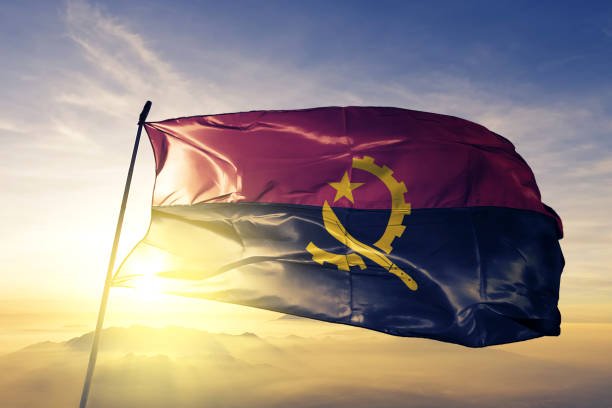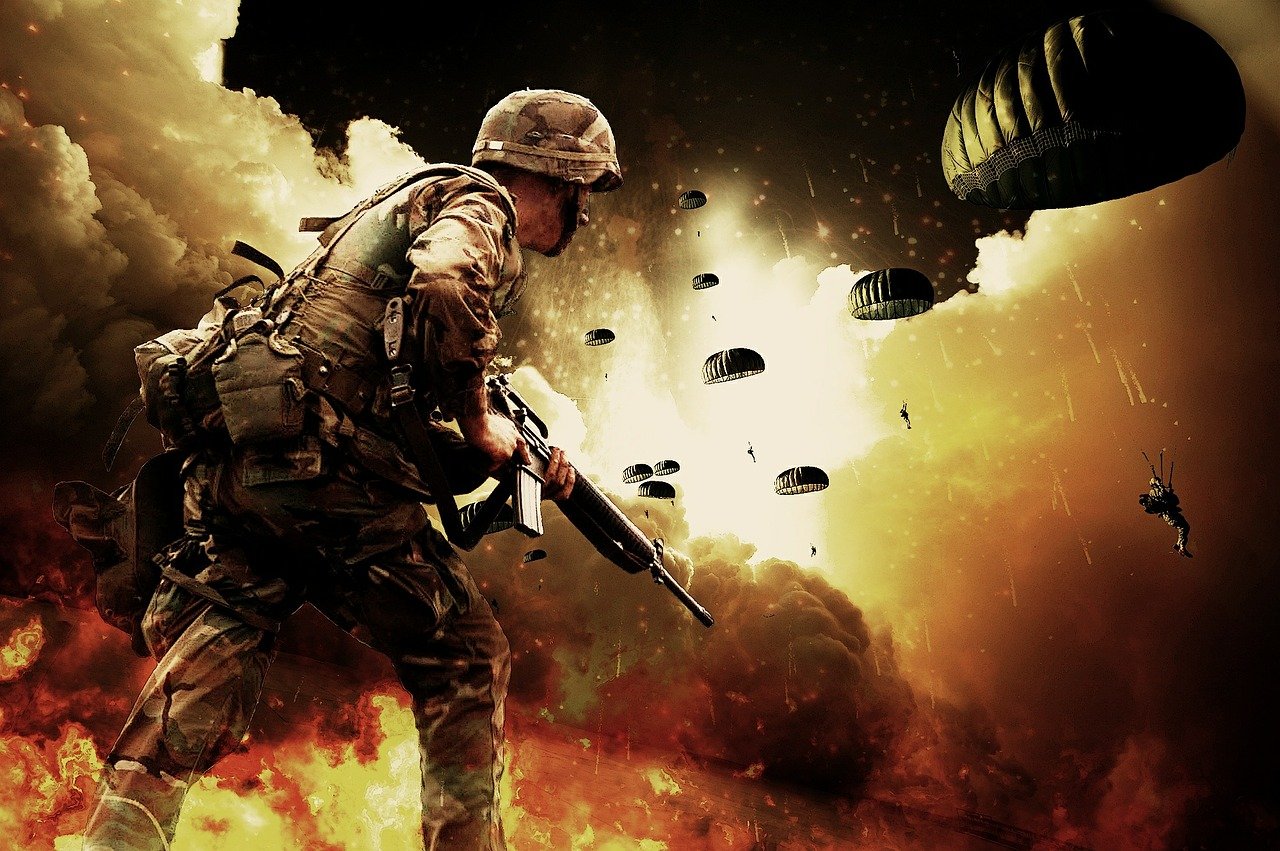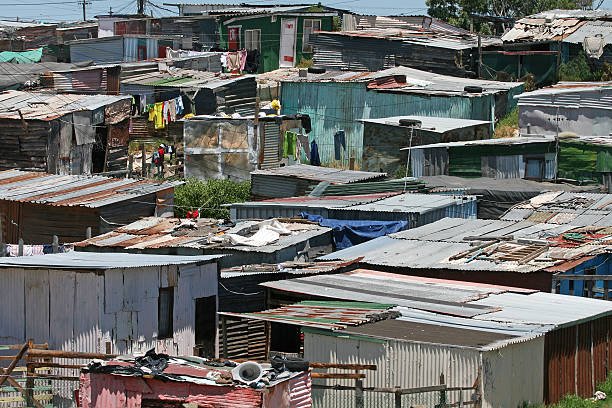Grade 12 History Angola Notes Collection: On this page you will find a compilation of Angola Notes for History Grade 12 subject: Origin of the Cold War, End of Cold War, Source-based Questions, Essay Questions.
From the mid-1970s, the Cold War between the USA and the USSR turned into a ‘hot war’ in Angola. The challenges facing the newly independent Angola were exploited by the superpowers and their allies. This was done in the hopes that they (the superpowers) could expand their sphere of influence into that region. The civil war which broke out in Angola in the mid-1970s was soon fought along Cold War battle lines. In Angola, the Soviets (through their ally, Cuba) backed one Angolan nationalist group and the USA through their ally, South Africa) backed their rival.
History of Angola
Grade 12 History Cold War: Angola Notes Collection, with Source-based Questions
On this section, you will find Grade 12 History Cold War: Angola Notes Collection, with Source-based Questions. This content will be great for Essays
How Africa was drawn into the Cold War
The USA wanted to limit the spread of communism in Africa, and therefore often supported factions that were anti-communist.
- In Ethiopia, for example, the USA supplied weapons and support to Haile Selassie, to boost his rule against a communist revolutionary movement.
- In Angola, the USA sided with a capitalist-leaning nationalist group, sending weapons and military support via South Africa.
- The apartheid government feared that if its neighbouring countries became socialist or communist, then they would allow the African National Congress (ANC) and the South West African People’s Organisation (SWAPO) to establish military bases in these countries, from which the ANC and SWAPO could launch attacks on South African apartheid forces.
- The apartheid government also wanted to maintain a good relationship with the USA and the UK, which were both powerful allies. The Cold War provided a convenient justification for the USA and the UK to support apartheid, South Africa.
- As is to be expected, a number of African states saw American and British support for the apartheid regime in South Africa as politically suspicious and were therefore wary of forming relationships with them.
Angola under Portuguese Rule
- The USA wanted to limit the spread of communism in Africa, and therefore often supported factions that were anti-communist.
- In Ethiopia, for example, the USA supplied weapons and support to Haile Selassie, to boost his rule against a communist revolutionary movement.
- In Angola, the USA sided with a capitalist-leaning nationalist group, sending weapons and military support via South Africa.
- The apartheid government feared that if its neighbouring countries became socialist or communist, then they would allow the African National Congress (ANC) and the South West African People’s Organisation (SWAPO) to establish military bases in these countries, from which the ANC and SWAPO could launch attacks on South African apartheid forces.
- The apartheid government also wanted to maintain a good relationship with the USA and the UK, which were both powerful allies. The Cold War provided a convenient justification for the USA and the UK to support apartheid South Africa.
- As is to be expected, a number of African states saw American and British support for the apartheid regime in South Africa as politically suspicious and were therefore wary of forming relationships with them.
Download Studyguide Notes below:
Cold War – Areas & Forms of Conflict: Angola Essay Question Guide
Below is a guide on how to answer the source-bassed questions for Grade 12 History, focusing on Cold War – Areas & Forms of Conflict: Angola.
Note: The Key Question will appear at the beginning of every section in the exam paper. Thisquestion tells you what the OVERALL content to be tested will be. In this case, the KeyQuestion tells us the section will test how The Cold War affected Angola. NB: Learners DO NOT answer this question.
How to analyse a cartoon for source-based History Grade 12 Questions
Cartoons will give the artist‟s point of view on a particular topic. They are useful in reflecting the attitudes of the time. When studying a cartoon, teachers will ask the following questions:
- How are the people drawn? Are they realistic? What size are they? Are some of their features exaggerated? How are they dressed?
- What view of the people does the cartoon give?
- What else is included in the cartoon? Is there any writing on the cartoon itself?
- What symbols are used to get the message across?
- What information do the date and caption contribute?
- Where was the cartoon published?
- What is the artist‟s intention?
- Does the cartoon offer a positive or negative perspective on the topic?
- What do you know of the period that might support your view of the cartoon?
- What does the interpretation of the topic tell you about the artist? Can you find bias? Can you work out what issue or whom the cartoonist supports?
In respect of the Cold War, the focus for the exams is on Angola. Angolabecomes the pawn in the balance of power between the Soviet Union and the UnitedStates. One must note that in Angola civil conflict is manipulated by the Cold Warpowers to increase their prestige.
Source A:
Angola is potentially one of the richest countries in sub-Saharan Africa with extensive petroleum reserves, rich agricultural land and valuable mineral resources. Few countries in the world have experienced aswell as sustained the degree of violent conflict seen in Angola. The intervention has diminished but has not disappeared. Angola‟s abundant natural resources continue to attract outside interests from industrialised nations globally. In the competition for oil, diamonds and other precious resources in Angola, interests external to Angolacontinue to play a large and decisive role, both in suppressing conflict and in sustaining it. The end of the Cold War changed the political landscape of Africa since the 1990‟s and opened new vistas for the continent, it helped in reshaping international relations as well as the emergence of new concepts of security and self-interest. It eliminated the division of Africa into two ideological camps and eliminated a source of external support that was taken for granted.
Note: Learners must answer all questions in FULL SENTENCES, as bullet points are not acceptable in an exam situation. They must also be specific as to which source and which part of the source they are referring to in their answer. When asked to quote, learners must make sure they answer using quotation marks and that the quotation includes only the relevant phrase or sentence.
Source-based Questions: Source A
- The source refers to violent conflict in Angola. This violent conflict began with Angola‟s independence in 1975. Briefly explain why independence sparked violence in Angola.
- According to the source why is Angola continually an arena for external intervention? Quote from the source to support your answer?
- The source refers to two ideological camps during the Cold War. What were these two ideological camps?
- The MPLA and UNITA were the two main opponents in the Angolan Civil War. The name which ideological camp supported the MPLA and which camp supported UNIT A.
- Briefly explain how the involvement of the above camps would accelerate and prolong the conflict.
Source C
An extract from a speech by Fidel Castro at the First Congress of the Communist Party ofCuba, Havana, December 1975. Quoted in D. Deutschmann (ed), Changing the History of Africa, 1989.
| Angola is a territory rich in natural resources. Cabinda, one of Angola‟s provinces, has large oil deposits. This country has great mineral wealth – diamonds, copper, iron. This is one of thereasons why the imperialists want to take hold of Angola. |
Source D
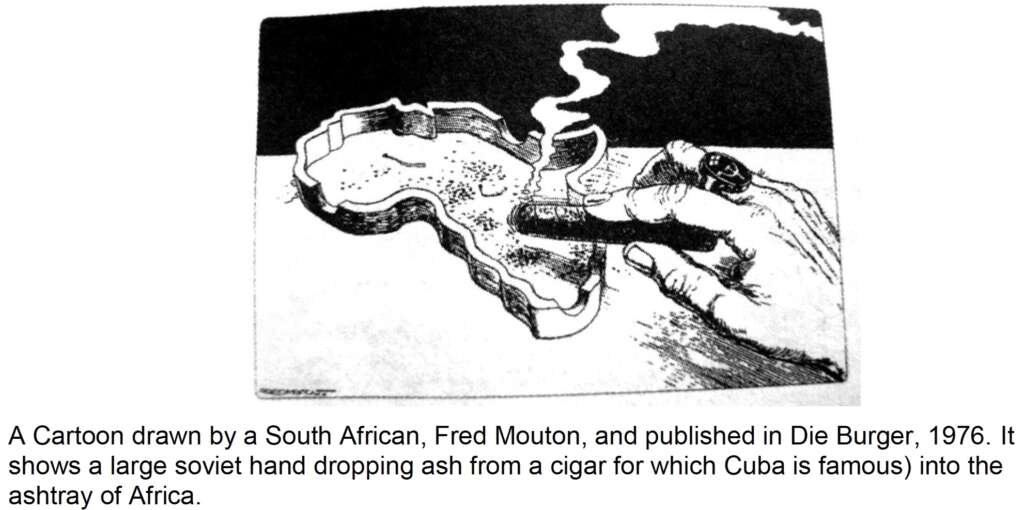
When asked to compare sources, the learner must be reminded that sources can be opposite or similar. They may entrench a viewpoint or be in opposition to each other. Learners need to examine the origin of the source (whose view is this, secondary or primary etc.) and then examine the content itself. They can then decide whether the sources complement or oppose each other and give a detailed explanation as to why they came to this conclusion.
Source-based Questions: Source C and D
Explain in detail how Source C and source D compare. In your answer, refer to both content and origin.
Source E
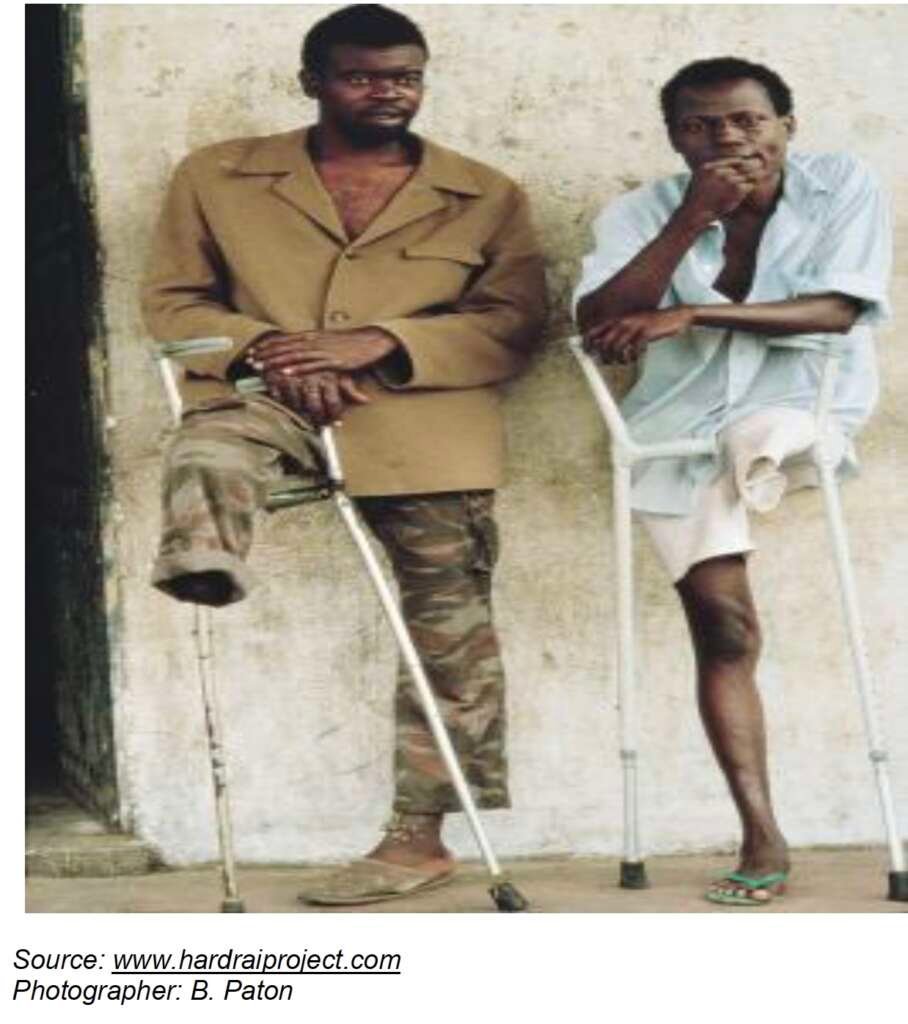
Note: When asked to evaluate the value of a source, learners are being asked to decide on whether or not the source enhances their study. They must always ask themselves the following questions: Does the source display bias or not? If so what can that bias teach them? What element and knowledge does this source impart and why does this help them understand the topic more clearly? The type of source is also relevant.
Source-based Questions: Source E
- Is Source E a primary or secondary source?
- What is the value of Source E in our study of the Angolan civil war?
- What impact would the image in Source E have on the Angolan economy in post-civil war days?
Source-Based Question: Conflict in Africa: Angola- Ending the Cold War in Southern Africa
The first glimpse of peace in Angola‟s interminable (never-ending) civil war came in 1990 as the Cold War drew to a close. Throughout the 1980‟s Angola had remained a pawn in the Cold War, a theatre in which the US and the Soviet Union used proxy (outside representative) forces to compete for ascendancy power and control). While the Russians and the Cubans continued to prop up the MPLA‟s (Popular Movement for the liberation of Angola) Marxist regime in Luanda, the Americans, along with the South Africans, sustained Jonas Savimbi‟s rebel UNITA( National Union for the Total Independence of Angola)movement.
In 1990, after the Russians had lost interest in Angola, the MPLA formally abandoned Marxism-Leninism and pronounced itself in favour of economic reform. The MPLA followed with the decision at its congress in December 1990 to adopt a multiparty system and moved, albeit haltingly, towards market-orientated economic policies, after finally obtaining membership of the International Monetary Fund (IMF) and World Bank. The forms it instituted, however, provided yet more business opportunities for the elite, notably the privatisation of state assets.
An extract from: Conflict in Africa: Angola- Ending the Cold War in Southern Africa
Essay Question on Angola History
Describe why Angola became an arena for Cold War ideologies and examine how this developed into a Proxy War with Cuban and South African involvement. Your answer must include your own knowledge and you can use the sources provided in the short questions.
Note: The essay question counts 40% of the exam. Learners need to learnthe format and how to refer to sources. No bullet points allowed!
- Using the source and your own knowledge, explain why and who Russia used to fight their Proxy War in Angola?
- Using your own knowledge, why did the Soviet Union support the MPLA?
- According to the source and your own knowledge, why did the MPLA abandon Marxism in favour of market-orientated economic policies?
Answers and Memos for the above source-based questions
Download the Answers and Memos for the above source-based questions from the document below:
More Notes
Independent Africa: Case study-Angola

